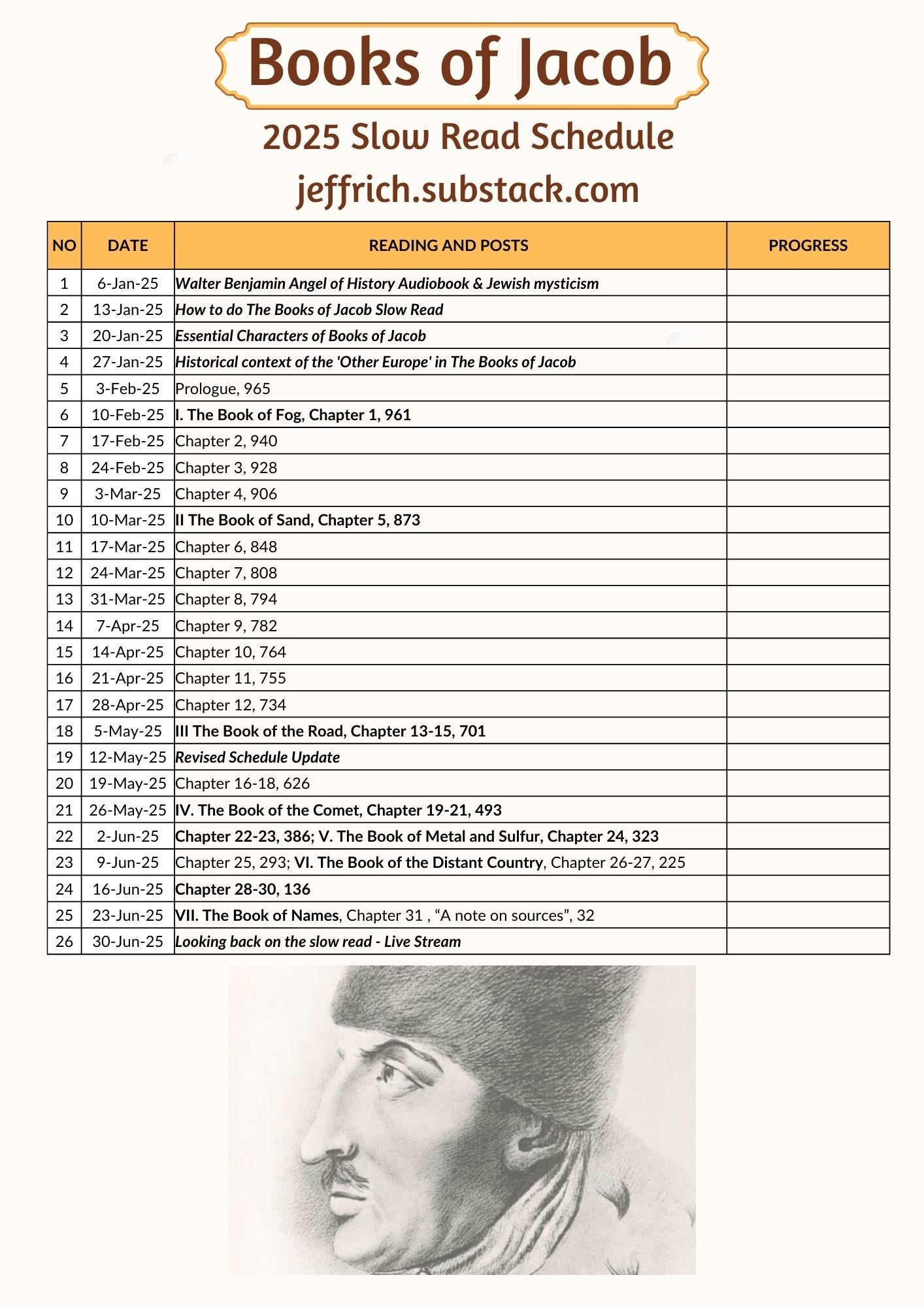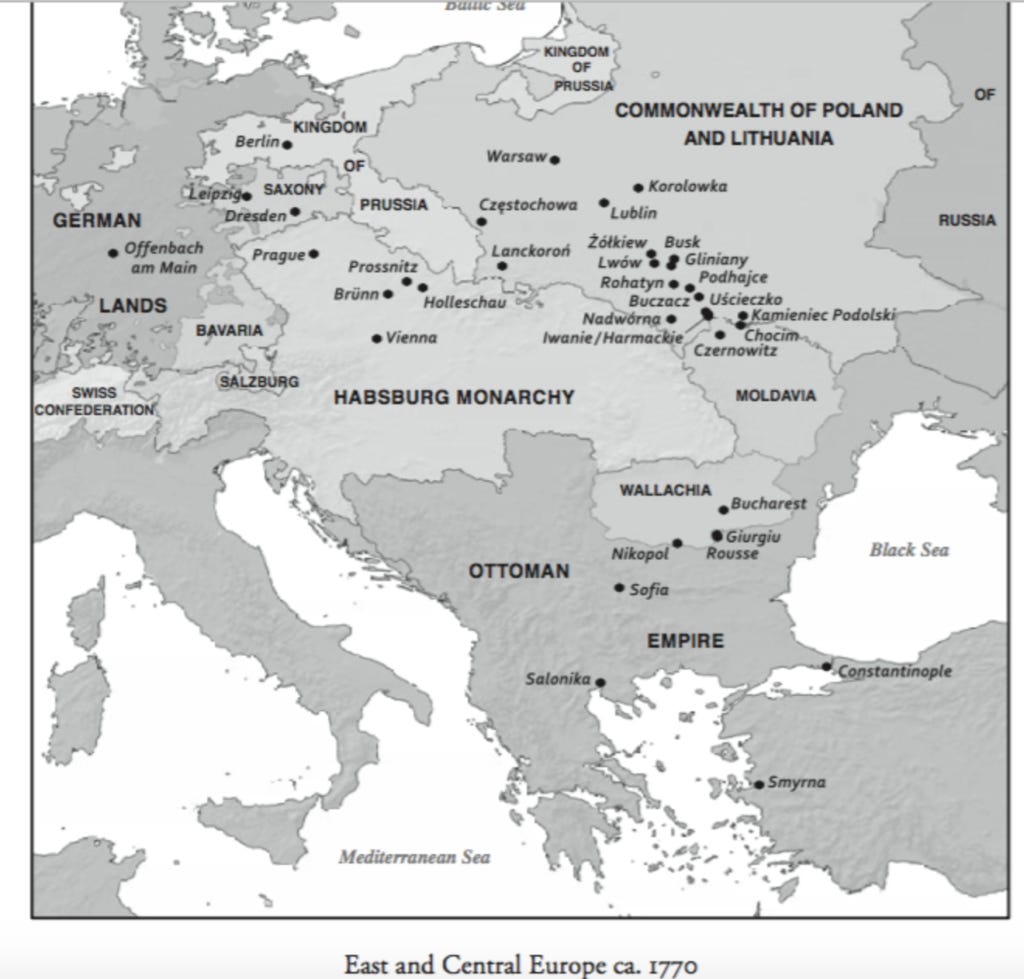Slow Reads
Welcome to the Slow Reads program of the Burning Archive.
In 2025 can join me in reading Olga Tokarczuk, The Books of Jacob, and the Mahabharata, slowly.
I will be updating this page throughout the year. Bookmark it and use it as a reference.
What is a ‘Slow Reads’ program?
A ‘slow read’ or read along program is an online book group that reads classics or modern masterpieces slowly, with some guidance from a facilitator through posts and chat.
Participants share their experience of the book. It is not formal study. It is an appreciative reading experience in good company.
There is no test. There is no deadening literary criticism. It is way of reading long, rewarding books with the company of appreciative fellow readers.
Examples of these programs include Simon Haisell, who does War and Peace and Wolf Hall, and Samantha Rose Hill, with whom I read Thomas Mann, The Magic Mountain.
My ‘Slow Reads’ program will be a bit different, reflecting my interests in history, cultural perspectives from around the world, and modern literature.
I have chosen:
one contemporary classic, Olga Tokarczuk, The Books of Jacob, and
one epic from the non-Western canon, the Mahabharata.
The Slow Read of The Books of Jacob starts on 3 February.
I am writing posts in January to orient you to the book.
You can however join at any time and read at your own pace. This page will always be here for you.
The Slow Read of the Mahabharatha will start in October 2025. I will give you more details closer to the date.
For now, let’s focus on how to participate in the Slow Read of The Books of Jacob.
A NEW YORKER "ESSENTIAL READ"
"Just as awe-inspiring as the Nobel judges claimed." - The Washington Post
"Olga Tokarczuk is one of our greatest living fiction writers. . . This could well be a decade-defining book akin to Bolaño's 2666." -AV Club
"Sophisticated and ribald and brimming with folk wit. . . The comedy in this novel blends, as it does in life, with genuine tragedy." -Dwight Garner, The New York Times
LONGLISTED FOR THE 2022 NATIONAL BOOK AWARD
NAMED A BEST BOOK OF THE YEAR BY THE NEW YORK TIMES, THE WALL STREET JOURNAL, TIME, THE NEW YORKER, AND NPR
What you do on the Slow Read of The Books of Jacob
First, get the book. It was published in English in late 2022, translated by Jennifer Croft. There are two English language editions which you can buy at these affiliate links: Fitzcarraldo edition and Riverhead/Text Books edition (the version I use).
Second, get a feel for Olga Tokarczuk. You don’t need to have read any other works by Tokarczuk to appreciate The Books of Jacob. Her style is accessible, friendly, and immediately engaging. It does help to get a feel for her concerns and interests at a time that works for you. I will be sharing some resources and links with you soon to help you do that.
Third, get a feel for the history of the ‘Other Europe’ of Eastern Europe. Don’t worry if you don’t know much now. I will be sharing many guides, insights, book recommendations and resources with you during the Slow Reading program
Fourth and finally, start reading. It is that simple. There is no test. There is no right or wrong response. There is no rush.
The main thing is to enjoy this awe-inspiring, decade-defining book by one of the world’s greatest living writers.
How the 2025 ‘Slow Read’ works
It is easy to join the slow read program. Just subscribe and I will send you a weekly post on Monday morning that summarises the story of the chapter for the week, and points to key characters, context, and chat questions for the week. Paid subscribers and Angels of History get bonus content. But all subscribers join the caravan to read the amazing story of Jacob Frank.
So relax and enjoy this great novel. You can follow the 32-week program reading about 30 pages a week. In May I changed the pace to about 15 pages a day, or three chapters a week. If you want to go faster or slower or jump in and out depending on your schedule, that is fine. This page will always be here for your reference.
So let me help you make this thousand-page masterpiece one of your best reads of 2025.
The Reading Schedule
I set out the complete yearly schedule for the Slow Read in this post. In May I revised the schedule after feedback from readers that we could go more quickly.
Here is the revised schedule for the Books of Jacob, with a column to mark your progress, a map of the places featured in the novel, and a head shot of Jacob Frank.
Index of posts for 2025 Slow Read - Tokarczuk, The Books of Jacob
January (Getting Ready for the Slow Read)
6 January - My mini audiobook reading of Walter Benjamin, 'Concept of History' and its surprising link to Jewish mysticism in The Books of Jacob
13 January - Tips on how to do the 'slow read' of The Books of Jacob
20 January - An overview of the characters of The Books of Jacob
27 January - Historical context of the 'Other Europe' in The Books of Jacob
February (Slow Read of The Books of Jacob begins: Prologue, I. Book of Fog) Character and Context in brackets
3 February - Books of Jacob Prologue (Yente, the Tender Narrator)
10 February - I. Book of Fog, Chapter 1 (Benedykt Chmielowski, Rohatyn and the history of multicultural Eastern Europe.
17 February - I. Book of Fog, Chapter 2 (Katarzyna Kossakowska, Polish society and nobility, the szlachta)
24 February - I. Book of Fog, Chapter 3 (the Shorr family, Jews in 18th century Poland)
March (I. Book of Fog, II Book of Sand)
3 March - I. Book of Fog, Chapter 4 (Kajetan Sołtyk, the Catholic Church in 18th century Poland)
10 March - II. Book of Sand, Chapter 5 (Nahman, founder of Hasidic Judaism, Israel Ba’al Shem Tov, BeSh’T)
17 March - II. Book of Sand, Chapter 6 (Jacob Frank, the Frankist Movement)
24 March - II. Book of Sand, Chapter 7 (Yente, Sabbatai Tzvi and Sabbateanism)
31 March - II. Book of Sand, Chapter 8 (Reb Mordke and the Tree of Life and Jewish Messianism)
April (II. Book of Sand)
7 April - II. Book of Sand, Chapter 9 (Hannah and Tovah, daughter and father, and Ottoman and Muslim Europe)
14 April - II. Book of Sand, Chapter 10 (Antoni Kossakowski or Moliwda, and European enchantment with antiquity in Polish culture)
21 April - II. Book of Sand, Chapter 11 (Malka and historical context on the Bogomils)
28 April - II. Book of Sand, Chapter 12 (Hana and the Shekhinah)
May (III Book of the Road, IV Book of the Comet)
5 May III. Book of the Road, Chapters 13 to 15 (Gitla Pinkasówna and the real incident at Lanckoroń on which Tokarczuk based her story)
19 May III Book of the Comet, chapters 16-18 (Elżbieta Drużbacka, the Seven Years War)
26 May IV Book of the Comet, chapters 19-21 (Asher Rubin, the Frankists’ 1759 conversion, blood libel and Hasidism).
2 June , IV The Book of the Comet and V. The Book of Metal and Sulfur, Chapters 22 to 24, (Father Gaudenty Pikulski, Częstochowa the holy site of Polish Christianity and Jacob’s prison)
16 June, V. The Book of Metal and Sulfur, and VI. The Book of the Distant Country, Chapters 25 to 27, (Moshe Dobrushka/ Thomas von Schönfeld,
The Partition of Poland and the Last King of Poland)
23 June, VI. The Book of the Distant Country, Chapters 28 to 30, (Eva Frank,
The Female Messiah, Empress, and Novelist at the end of the ancient regime).
30 June, VII. The Book of Names, Chapter 31, (The Exodus of the Book of Names
The Caves of Korolówka and the Holocaust).
The People of The Books of Jacob
One joy of reading Tokarczuk is the vibrancy of her characters. There are many characters fictional, historical, and drawn from history in The Books of Jacob.
I will provide notes on these characters - in the novel and in history - in my weekly posts for paid subscribers. I will keep an indexed page of characters for paid subscribers here as well.
The Fantastic Journeys through History
One challenge of reading The Books of Jacob is the rich historical context of Eastern Europe in the 17th and 18th centuries. Tokarczuk celebrates the many cultures, faiths, heresies, and histories of Eastern Europe, including the old Commonwealth of Poland and Lithuania (including modern day Ukraine), European Jews, and Ottoman Europe. However, many readers will be unfamiliar with this history.
But I am a student of history, and I will guide you through this fascinating history. I am writing posts in January that will provide some crucial context and resources where you can discover more. And every week for my paid subscribers I will provide notes on the fantastic journeys through history that Tokarczuk invites us to make.
But of course, with any study of history, a map always helps.
The Map of The Books of Jacob
In my notes on historical context, I will comment on the places in which the novel is set. One resourceful student of Tokarczuk has made this map of Europe in the 18th century showing the main locations of the novel. I will share more historical maps and notes on places, then and now, with you throughout the Slow Read.



